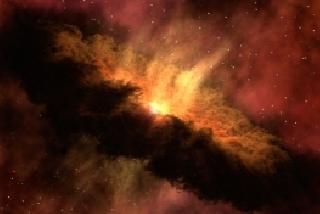
The artist's concept illustrates a dusty planet-forming disk, similar to the one that vanished around the star called TYC 8241 2652. Image credit: NASA/JPL
SAN DIEGO (BNS): The mysterious and sudden disappearance of huge chunk of dust - enough to fill an inner Solar System - around a young sun-like star has puzzled astronomers.
The dusty disk of rocky debris around the nearby star TYC 8241 2652 was first spotted by NASA's Infrared Astronomical Satellite (IRAS) in 1983. The material, thought to originate from collisions of rocky planets, continued to glow brightly for 25 years.
TYC 8241 2652 lies in the direction of the constellation of Centaurus. The star is roughly 10 million years old and 450 light years distant.
The first strong indication of the disk's disappearance around the star came from images taken in January 2010 by NASA's Wide-field Infrared Survey Explorer (WISE). An infrared image obtained at the Gemini telescope in Chile on May 1, 2012, confirmed that the dust has now been gone for two-and-a-half years.
"It's like the classic magician's trick: now you see it, now you don't. Only in this case we're talking about enough dust to fill an inner solar system and it really is gone!" said Carl Melis of the University of California, San Diego, who led the new study appearing in the July 5 issue of the journal Nature.
Added co-author of the study Ben Zuckerman: "It's as if you took a conventional picture of the planet Saturn today and then came back two years later and found that its rings had disappeared."
The researchers have come up with a couple of possible solutions to the mystery, but they say none are compelling.
One possibility is that gas produced in the impact that released the dust helped to quickly drag the dust particles into the star and thus to their doom. In another possibility, collisions of large rocks left over from an original major impact provide a fresh infusion of dust particles into the disk, which caused the dust grains to chip apart into smaller and smaller pieces.
"We were lucky to catch this disappearing act. Such events could be relatively common, without our knowing it," Zuckerman said.
 Previous Article
Previous Article Next Article
Next Article












The Indian Air Force, in its flight trials evaluation report submitted before the Defence Ministry l..
view articleAn insight into the Medium Multi-Role Combat Aircraft competition...
view articleSky enthusiasts can now spot the International Space Station (ISS) commanded by Indian-American astr..
view article